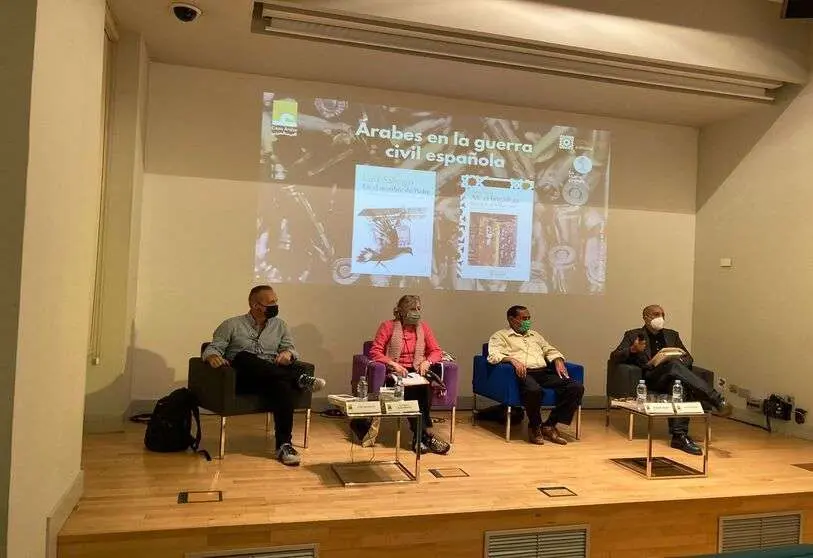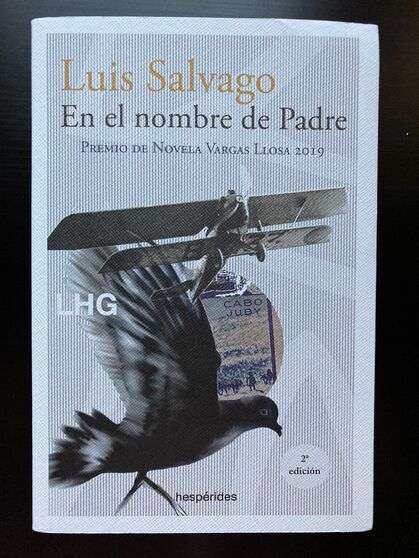Arabs in the Spanish Civil War

"The first time I shot a man I forgot to brush my teeth. This is the resounding sentence, like a whiplash, that opens the novel. En el nombre de Padre (Ed. La Huerta Grande, 332 pages), by the Valencian Luis Salvago, presented at the Casa Árabe in Madrid together with the third work by the Palestinian Hussein Yassin: Alí, el brigadista. Historia de un hombre recto (Ed. Comares, 326 pages). Two stark stories, dissected by both in a vibrant colloquium moderated by Carmen Bravo Villasante.
Both books show that the Spanish Civil War is a wound that has not yet closed, and that there are still episodes that remain largely unknown to the general public. The participation of Arab combatants on both sides of that bitter confrontation between Spaniards is one of them.
Salvago, a non-commissioned officer in the Air Force, tackles the genesis of that conflict from the obsessive desire of a father who tries to impose the logic of his convictions on his son. It is the story of a young man from Tangiers who is assigned to the disciplinary company in charge of the firing squad at Cape Juby, in the then Spanish protectorate in North Africa. In addition to the harshness of the African desert and the horror of the task he is given, there is his own personal battle to free himself from his father's imprint, which will make him relive his past because, as the author says: "a generation expects the generation that succeeds it to resolve what was left unresolved by the previous generation".

The novel is plagued by the many doubts of someone who has the routine mission of liquidating other lives, other men, other illusions and hopes cut down with the flash of a single shot. "Do you really think it is necessary to feel fear"... I said yes, "fear without reason, fundamental fear, makes you feel alive". Reflections that move, because after all, "between memory and the ground, sometimes there is only the height of a bed".
A story that is presented as that of those who fought on the wrong side, and for whom the outcome of the war was always a defeat. Although the underlying doubt is whether that defeat was not everyone's defeat, the inexorable corollary of any civil war.
Ali, qissat rayul mustqim is the original title of the third novel by Hussein Yassim, born in Arrabat al-Battuf in northern Galilee in 1943 and now living in Jerusalem. In Ali, the Brigadier, Yassim focuses on the story of five Palestinian Arabs who came to Spain in defence of the Republic: Nayati Sidqi, Fawzi Sabri al-Nablusi, Nayib Yusuf, Malih al-Jaruf and, above all, Ali Abduljáliq, the protagonist of the work, whose remains currently lie in the common ossuary of the Los Llanos cemetery in Albacete.

Starting from a real and incontrovertible fact, Hussein Yassim reconstructs Ali's life from birth to the grave. He traces the stages that led him to herding in the village as a child, to becoming an active member of the Palestinian Communist Party, to receiving political training in Moscow, and to being imprisoned several times on charges of subversive and terrorist attacks and activities. The British authorities gave him the choice between serving his full sentence or leaving the country to fight in the Spanish Civil War.
The story, translated into Spanish by Antonio Martínez Castro, covers all the British political manoeuvres that would gradually lead to clashes between Arabs and Jews in Palestine, which was doomed to partition in the future. And, of course, the vicissitudes that led Ali and hundreds of other Arabs to fight with the International Brigades under the suffocating propaganda of making them believe that the Spanish civil war was also theirs. A conviction that passes through various stages of doubt, as what they witness in the trenches on this side of the Mediterranean makes them reflect on the lies and propaganda in which they grew up and were trained in their native Palestine.

The work opens with a foreword by the Arabist Pedro Martínez Montávez, recalling the pain and plunder suffered by Palestine since the 1930s.
It should be noted that this work is also available online in chapters in audio-novel format, an increasingly widespread phenomenon, which reflects the importance of sonority and the weight of the oral tradition in Arabic literature.

